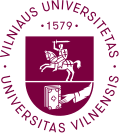
Back Universiteit van Vilnius Afrikaans جامعة فيلنيوس Arabic جامعة ڤيلنيوس ARZ Vilnüs Universiteti Azerbaijani Vėlniaus onėversėtets BAT-SMG Вільнюскі ўніверсітэт Byelorussian Віленскі ўнівэрсытэт BE-X-OLD Вилнюски университет Bulgarian Universitat de Vílnius Catalan University of Vilnius CEB
Vilniaus universitetas | |
 | |
| Latin: Universitas Vilnensis[1] | |
Former names | Academia et Universitas Vilnensis Societatis Jesu (1579–1781) Principal School of the Grand Duchy of Lithuania (1781–1797) Principal School of Vilnius (1797–1803) Imperial University of Vilnius (1803–1832) Stephen Báthory University (1919–1939) University of Vilnius (1939–1943) State University of Vilnius (1944–1955) Vincas Kapsukas State University of Vilnius (1955–1989) Vilnius University (1990–)[2] |
|---|---|
| Motto | Hinc itur ad astra (in Latin) |
Motto in English | From here the way leads to the stars |
| Type | Public |
| Established | 1579 |
| Founder | King of Poland and Grand Duke of Lithuania Stephen Báthory |
Religious affiliation | St. John's Church |
| Budget | €202 million (2023)[3] |
| Chancellor | Raimundas Balčiūnaitis |
| Rector | Rimvydas Petrauskas (lt) |
Academic staff | 3,348 |
| Students | 23,517 |
| Undergraduates | 14,025 |
| Postgraduates | 7,071 |
| 797[4] | |
Other students | 825 (MDs in residency) 1995 (international students) |
| Location | , , 54°40′57″N 25°17′14″E / 54.68250°N 25.28722°E |
| Campus | Urban |
| Colors | Maroon |
| Affiliations | EUA, ARQUS European University Alliance, Santander Network, UNICA, Utrecht Network |
| Website | vu.lt |
 | |
Vilnius University (Lithuanian: Vilniaus universitetas) is a public research university, which is the first and largest university in Lithuania, as well as one of the oldest and most prominent higher education institutions in Central and Eastern Europe. Today, it is Lithuania's leading research institution.
The university was founded in 1579 as the Jesuit Academy (College) of Vilnius by Stephen Báthory. It was the third oldest university (after the Cracow Academy and the Albertina) in the Polish–Lithuanian Commonwealth. Due to the failure of the November Uprising (1830–1831), the university was closed down and suspended its operation until 1919. In the aftermath of World War I, the university saw failed attempts to restart it by the local Poles, Lithuanians, and by invading Soviet forces. It finally resumed operations as Polish Stefan Batory University in August 1919.
After the Soviet invasion of Poland in September 1939, the university was briefly administered by the Lithuanian authorities (from October 1939), and then after Soviet annexation of Lithuania (June 1940), punctuated by a period of German occupation after Operation Barbarossa, from 1941 to 1944, when it was administrated as the Vilnius State University. In 1945, the Polish community of students and scholars of Stefan Batory University was transferred to Nicolaus Copernicus University in Toruń.[5] After Lithuania regained its independence in 1990, following the dissolution of the Soviet Union, it resumed its status as one of the prominent universities in Lithuania.
Established in 1579 in Lithuania’s capital city Vilnius, with a faculty in the second-largest city, Kaunas, and another in the fourth-largest city, Šiauliai. The University is composed of fifteen academic faculties that offer more than 200 study programmes in a wide range of academic disciplines for over 24 000 students.[4] Vilnius University is known for its strong community ties, interaction and participation in additional activities offered by the non-academic departments of the University, such as the Cultural Centre, Health and Sports Centre, Library, Museum, Botanical Gardens, and other institutions.
Since 2016, Vilnius University has been a member of a network of prestigious universities–the Coimbra Group–and since 2019, it has belonged to the European University Alliance (ARQUS).The alliance aims to create joint, long-term, sustainable structures and mechanisms for close inter-institutional cooperation in the fields of studies, science and social partnerships.[6] The Vilnius University Foundation was established on 6 April 2016, becoming the first university endowment in Lithuania. The Foundation supports scientific research of the highest quality and the creation of study programmes that correspond to global demands, while encouraging other high added-value projects.[7]
- ^ "Search". Internet Archive.
- ^ "Universitas Vilnensis 1579-2004" (PDF). vu.lt. Retrieved 31 August 2023.
- ^ "Veiklos dokumentai". Vilniaus universitetas.
- ^ a b "Facts and Figures". Vilnius University. Archived from the original on 2 February 2019. Retrieved 5 August 2023.
- ^ Iłowiecki, Maciej (1981). Dzieje nauki polskiej. Warszawa: Wydawnictwo „Interpress”. p. 241. ISBN 83-223-1876-6.
- ^ "Arqus". Arqus. Retrieved 14 June 2023.
- ^ "VU 444 • Congratulate VU with an everlasting birthday gift!". Vilnius University Foundation. Retrieved 14 June 2023.